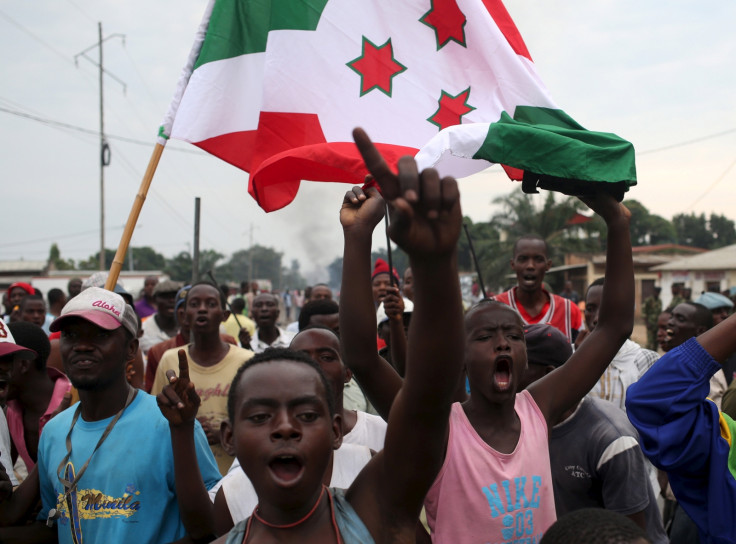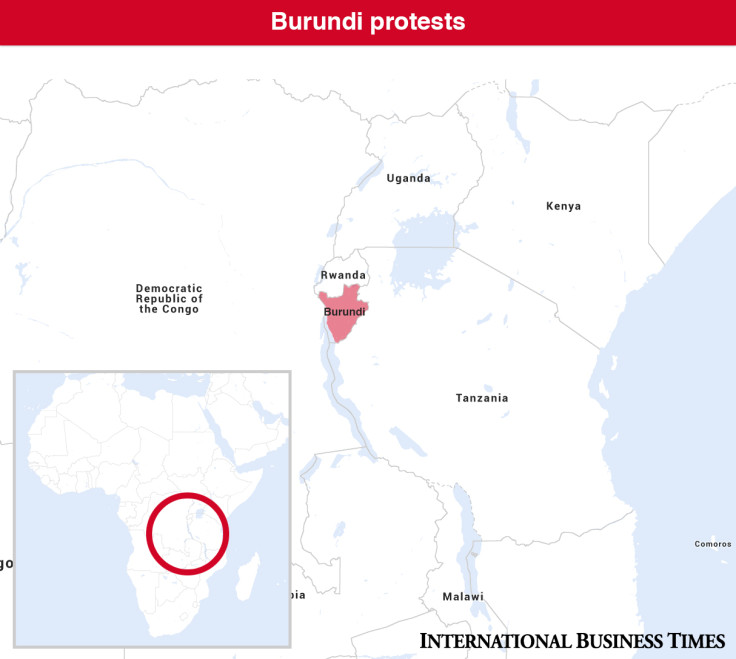Burundi: Nkurunziza's government accused of drafting hit-list of opposition leaders

The Burundian government has been accused of drafting a hit-list featuring opposition leaders amid growing calls for the country's president to step aside.
Burundi has been embroiled in anti-government protests since 26 April, with critics saying President Pierre Nkurunziza's bid for a third term contravenes rules set out in a peace accord that ended the 1993-2003 civil war.
Frederic Banvuginyunvira, the vice president of main opposition party the Front for Democracy in Burundi (known under its French acronym Frodebu), claims a hit-list featuring him and other opposition leaders has been drafted by the government.
The allegation follows the murder on Saturday (23 May) evening of Zedi Feruzi, the Muslim leader of minority party the Union for Peace and Democracy (UPD), and his bodyguard, who were killed at point-blank range by unidentified men with Kalashnikovs in the district of Ngagara.
A journalist from Bonesha FM radio, who was with Feruzi at the time of the shooting and survived, said the attackers were wearing the uniform of presidential guards, but the president's adviser Willy Nyamitwe claimed the murder was a ruse aimed at implicating the government.
'I'm the next person to eliminate'
"There has been a meeting about me. They have said: 'The next person to eliminate after Feruzi is Frederic'," Banvuginyunvira, who was appointed first vice-president of Burundi in 2001, told IBTimes UK on Wednesday (27 May).
"They want to eliminate me. A person who knew about the meeting called me and told me that people present at the meeting were from the secret services and the police. Someone else, a policeman, confirmed that to me the same night after having heard those people talk in a garage."
According to the Hutu progressive politician, he has become a target because he is one of the only leaders of the opposition left in the capital Bujumbura.
"They want to eliminate me. A person who knew about the meeting called me and told me that people present at the meeting were from the secret services and the police."
- Frederic Banvuginyunvira
"I have become too visible, because the people behind the opposition movement are no longer here, as they are now all in Rwanda, Tanzania and Kenya," he said over the phone from a secret location.
While Banvuginyunvira said he did not know which other individuals may be on the hit-list, he explained sources in the secret services had advised him to avoid public places, where they said he could be arrested or shot.
"They have also told me to stop using my car. I cannot tell you where I am now," he said.
Independent local journalists have also claimed to be on a government hit-list, with many telling IBTimes UK they had gone into hiding as they fear they could be killed as part of an "elimination plan" supposedly set out by those loyal to the president.
Rumours, a national sport
When asked about the allegations, Nyamitwe said "there is no list", adding that "spreading rumours has become a national sport".
"Anyone who speaks of these lists or macabre plans of elimination are those involved in spreading nameless rumours. This is not the first time in this country that rumours spread before an election – in 1993, 2005 and 2010 it was the same. It is no wonder that before these [elections] they spread too," Nyamitwe told IBTimes UK over the phone from Bujumbura.
According to the president's spokesman, hit-list rumours have been fabricated "to discredit the government and as an excuse not to continue the electoral process".
Under pressure

In Banvuginyunvira's view, the murder of Feruzi last weekend showed "nervousness by the government".
"The government is really nervous, everyone feels it. That's because all it had planned is being foiled, against a backdrop of international pressure."
On 26 May, Nkurunziza asked citizens for donations to help fund the 26 June elections after the international community withdrew its support, despite calls for him to end his candidacy.
Concerned about the escalation of violence in Burundi, Belgium's international development minister Alexander De Croo announced on 12 May that Belgium would suspend its aid to the country.
Belgium and the Netherlands provide financial support to the Burundian police but only €3m (£2.12m, $3.26m) of the €5m set aside for the purpose has been paid. De Croo also announced that another €2m to support the electoral process would be withheld.
The same day, the EU also announced it was withholding €2m of aid to Burundi.
Although the union has already paid €6m of the €8m designated to help fund the elections, it declared it had decided to withhold the balance until Nkurunziza heeded calls for a transparent poll.
© Copyright IBTimes 2024. All rights reserved.







